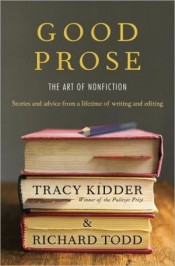Title: Good Prose: The Art of Nonfiction
Author: Tracy Kidder and Richard Todd
Genre: Nonfiction
Year: 2013
Publisher: Random House
Acquired: From the publisher through LibraryThing Early Reviewers
Rating: 




Review: In 1973, Tracy Kidder was a young freelancer, looking for his first assignment at the prestigious Atlantic Monthly in Boston. Fortuitously, Kidder was paired with editor Richard Todd to guide his story about a murder trial — a story Kidder naively thought of as the next In Cold Blood but other editors were ready to dismiss — from early drafts to publication.
This early partnership led to one of the most productive editorial couples working today and a deep friendship between the two men. In Good Prose, Kidder and Todd share the lessons on writing they’ve learned through 40 years of collaboration and offer their thoughts on three major forms of nonfiction — narratives, essays, and memoirs — as well as narrative strategies, the challenges of objectivity and subjectivity, and the ethics of writing nonfiction.
When I first started reading Good Prose, I thought that perhaps it was a book best read by other writers. But after finishing, I think Good Prose really is a book that is worth reading by anyone who likes to read about writing and wants to learn about the craft of narrative nonfiction, as Kidder and Todd point out in their introduction:
Good Prose is mainly a practical book, the product of years of experiment in three types of prose: writing about the world, writing about ideas, and writing about the self. To put this another way, this book is a product of our attempts to write and to edit essays, memoirs, and factual narratives. We presume to offer advice, even the occasional rule, remembering that our pronouncements are things we didn’t always know but learned by attempted to solve problems in prose. For us, these things learned are in themselves the story of a collaboration and a friendship.
It’s possible a book like this one could have felt very prescriptive, but Kidder and Todd help alleviate some of the how-to manual feel by included these charming digressions to talk in detail about their writing process or times when they were led astray. One of my favorites was the story of how they came to find the structure of Kidder’s most recent book, Strength in What Remains, a rather circuitous process that makes it clear even the best writers go through a few terrible first drafts. The digressions added both levity and a demonstrated expertise that elevated the book from writing manual to a good read in and of itself.
Another fabulous section — particularly for readers curious about the ethics of nonfiction — was a discussion of subjectivity included in the chapter “Beyond Accuracy.” This is, truly, one of my favorite paragraphs from the entire book:
But subjectivity properly understood is really just another name for thought. Subjectivity simply acknowledges the presence of a mediator between the facts and the truth. That mediator is you, the writer. Acknowledging subjectivity absolves you of nothing. On the contrary, it makes you the one who has to explore the facts, discover what you can of the truth, and find the way to render that truth in prose — knowing as you look for the way to do this that you cannot be complete, that every inclusion implies countless exclusions, that you must strive to do no violence to those facts and those truths that competed for your attention.
That’s just so clear and concise and too the point, and perfect explanation of why subjectivity is inherently part of narrative nonfiction, but that it shouldn’t threaten the accuracy or truth of the story the writer is trying to tell.
I could go on for pages, I’m sure, talking about all of the wonderful moments in this book. I just found the whole thing delightful and thoughtful, and appreciated how much it helped me think about my on reading and writing a little differently. I can’t recommend this one enough for nonfiction readers and writers who want to learn more about the craft.
Other Reviews:
If you have reviewed this book, please leave a link to the review in the comments and I will add your review to the main post. All I ask is for you to do the same to mine — thanks!


Comments on this entry are closed.
This sounds very interesting to me. I just read Behind the Beautiful Forevers. Narrative nonfiction at it’s best, if you ask me. I’m curious as to how that it done (and done so well!)
Behind the Beautiful Forevers is absolutely stellar. I loved that one.
I love the quotation about subjectivity and the writer being a mediator. That might actually bring me to read another Tracy Kidder book, which so far I’ve done only twice in 30 years. (The Soul of a New Machine, 1983 and Mountains Beyond Mountains, 2010).
Those are the two Kidders that I have read, although I have several on my shelves waiting for me.
I love that paragraph on subjectivity too and I think I may have to steal it for my literature course.
This sounds quite interesting, and I love the quote on subjectivity.